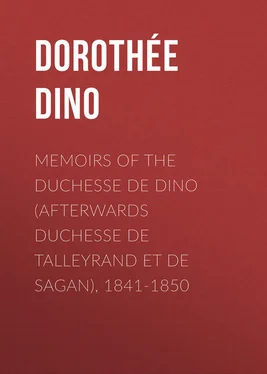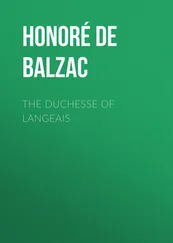Dino Dorothée - Memoirs of the Duchesse De Dino (Afterwards Duchesse de Talleyrand et de Sagan), 1841-1850
Здесь есть возможность читать онлайн «Dino Dorothée - Memoirs of the Duchesse De Dino (Afterwards Duchesse de Talleyrand et de Sagan), 1841-1850» — ознакомительный отрывок электронной книги совершенно бесплатно, а после прочтения отрывка купить полную версию. В некоторых случаях можно слушать аудио, скачать через торрент в формате fb2 и присутствует краткое содержание. Жанр: foreign_antique, foreign_prose, на английском языке. Описание произведения, (предисловие) а так же отзывы посетителей доступны на портале библиотеки ЛибКат.
- Название:Memoirs of the Duchesse De Dino (Afterwards Duchesse de Talleyrand et de Sagan), 1841-1850
- Автор:
- Жанр:
- Год:неизвестен
- ISBN:нет данных
- Рейтинг книги:4 / 5. Голосов: 1
-
Избранное:Добавить в избранное
- Отзывы:
-
Ваша оценка:
- 80
- 1
- 2
- 3
- 4
- 5
Memoirs of the Duchesse De Dino (Afterwards Duchesse de Talleyrand et de Sagan), 1841-1850: краткое содержание, описание и аннотация
Предлагаем к чтению аннотацию, описание, краткое содержание или предисловие (зависит от того, что написал сам автор книги «Memoirs of the Duchesse De Dino (Afterwards Duchesse de Talleyrand et de Sagan), 1841-1850»). Если вы не нашли необходимую информацию о книге — напишите в комментариях, мы постараемся отыскать её.
Memoirs of the Duchesse De Dino (Afterwards Duchesse de Talleyrand et de Sagan), 1841-1850 — читать онлайн ознакомительный отрывок
Ниже представлен текст книги, разбитый по страницам. Система сохранения места последней прочитанной страницы, позволяет с удобством читать онлайн бесплатно книгу «Memoirs of the Duchesse De Dino (Afterwards Duchesse de Talleyrand et de Sagan), 1841-1850», без необходимости каждый раз заново искать на чём Вы остановились. Поставьте закладку, и сможете в любой момент перейти на страницу, на которой закончили чтение.
Интервал:
Закладка:
The newspapers announce the death of M. de Bellune, who received the sacraments from the hands of my cousin, the Abbé of Brézé, in the presence of M. de Chateaubriand, the Marquis de Brézé and M. Hyde de Neuville. No one could come to an end as a more thorough-going Carlist than he. M. Alexandre de La Rochefoucauld has also died, but not in so Legitimist a fashion.
M. Royer-Collard is sad, depressed and ill, and is angry that M. Ancelot should have been elected to M. de Bonald's seat in the Academy instead of M. de Tocqueville.
Rochecotte, March 7, 1841. – I am delighted to hear that you like the letters of Madame de Maintenon, 12 12 Extract from a letter.
and am deeply flattered by the likeness that you find between the nature of her intellect and of mine. However, the Duc de Noailles has several times made the same observation to me. I wish I were more capable of living up to the resemblance. Apart from her mental qualities and a certain weakness due to her position and to the time in which she lived, she had a loftiness of soul, a firmness of character and a purity of principle and of life which raised her very high in my esteem and provided a better explanation of the astonishing fortunes which followed her, than her beauty, her grace and her lofty thoughts can do.
Rochecotte, March 8, 1841. – Yesterday evening my son-in-law read us a delightful article upon Mlle. de Lespinasse in the Revue des Deux Mondes of March 1. The article is well written and reminds me of several incidents which M. de Talleyrand told me of this personage, who was no favourite of his. He thought that she was wanting in simplicity, for one of the best features of M. de Talleyrand's taste was his respect and liking for simplicity. He admired it in every case, in mind, manner, language and feeling, and only a strange conjuncture of circumstances or a very strained position could ever prevent this noble instinct of simplicity from influencing his own character and actions. Exaggeration and affectation he always hated. My own failings in this respect were corrected in a remarkable degree by my intercourse with him. At the time of my marriage I was somewhat to blame in those directions, though I hope that is not the case now. The improvement is due to him, as are many other things, for which I cannot sufficiently thank his memory. To return to Mlle. de Lespinasse, I well remember reading her Letters which appeared shortly after those of Madame du Deffant. I was not greatly attracted by them; affected enthusiasm is by no means the same as real feeling, and passion is not tenderness. In view of the want of principle that characterised the eighteenth century, the one safeguard for the individual was the yoke imposed by society with its customs and demands. If one were ever so little outside that circle, there was no check, and imagination carried people very far and very low. Mlle. de Lespinasse, having neither family nor fortune, was not obliged to consider a society to which she only half belonged, and led the life of a clever man who is also a lady-killer. But now I seem to be writing an article on the subject myself and what we read yesterday is much better than this.
Rochecotte, March 9, 1841. – The following is an extract from a letter which I have from the Duchesse de Montmorency: "People here think only of fortifications: those who usually trouble but little about politics are full of them and society looks very askance upon those who are supposed likely to vote in support of the law. My husband says that he has not yet been enlightened ; our family interprets this to mean that the King has won him over. The fact is that he is influenced by my son who has been commissioned by the Château for this purpose, all of which vexes me exceedingly.
"M. Gobert, treasurer of the fund for the orphans of those who died of cholera, was very devoted to the memory of the late Mgr. de Quélen, and had a terrible scene with Mgr. Affre at a meeting of the committee, when the Archbishop wished to dismiss him. M. Gobert replied that he would not stir; in short, the whole business was very scandalous and it is impossible to understand how these scenes of fury and abuse of authority will end.
"The Duc de Rohan is marrying his daughter to the Marquis de Béthisy, a very suitable match.
"In the newspapers you will see the filial comedy that has been played by the Prince de la Moskowa. M. Pasquier is praised for not having allowed him to speak. I am told that the Duc d'Orléans induced the Prince de la Moskowa to enter the House of Peers in order that he might vote for these stupid fortifications. It is also the Duc d'Orléans who influences the Journal des Débats . Old Bertin and the chief editors are strongly opposed to the fortifications, but young Bertin, orderly officer to the Duc d'Orléans and M. Cuvillier Fleury, private secretary to the Duc d'Aumale, insert what they please in the newspaper, or rather what the Château pleases. I know that Bertin de Veaux said the other day to one of my friends, 'Pray do not think that I am inclined to support so fatal a measure.'"
Rochecotte, March 14, 1841. – It was so fine yesterday and I had owed a call so long to the wife of my sub-prefect, 13 13 The Sub-Prefect of Chinon at that time was M. Viel.
that I resolved to go to Chinon with my son-in-law between lunch and dinner. The road from this house to Chinon is pretty and easy. At Chinon itself I visited the great and noble ruins of the castle which overlook the rich and smiling valley of the Vienne: the room where Joan of Arc offered her holy sword to Charles VII.; the tower where Jacques Molay, the grand master of the Templars was long confined; and the subterranean passage leading to the house of Agnes Sorel; all these things can still be seen and one regards them with the eye of faith, which is the most important element in archæology. If this ruin were restored as that of Heidelberg has been, the result would be most picturesque. I stayed for a quarter of an hour at the office of the charity organisation where the Sister Superior now is who spent fourteen years in the household of Valençay and who had several times expressed a desire to meet me. She is a thoroughly good person and liked everywhere, and her departure was much regretted at Valençay. When I rang the bell a sister came to tell me that the Mother Superior was at the point of death and had received the last sacraments a few hours before. However, I asked her to tell the invalid that I was there and she insisted upon seeing me. I was much saddened by the interview which cheered the failing life of this excellent person. She told me, as the late Mgr. de Quélen once told me, that from the first day when she had seen me to the day of her death which was now at hand she had never passed a day without praying for me. It is good to be loved by Christian souls and their loyalty is to be found nowhere else.
When I returned from Chinon I found two letters which will influence my movements during the summer; one was from the King of Prussia who had heard of my travelling proposals and asks me to go and see him at Sans Souci. This induces me to go to Berlin about May 12 and so one point is settled. The other letter is from my sisters who tell me that they will remain at Vienna until July 1, and that I ought to carry out the proposal I had formed to go and see Madame de Sagan there if she had lived. I am anxious that the tie between my sisters and myself should be maintained. This is only as it should be and it is also a comfort; we are now reduced to a very small group and the tie of blood has a strength which one is surprised to find persisting in spite of all that should naturally destroy it or at any rate weaken it.
Rochecotte, March 16, 1841. – Yesterday I had a letter from Madame de Lieven who says: "The Firman conferring heredity seems sheer humbug; such was the opinion of the Pasha and even more so the opinion of Napier, the English admiral. He has advised the Pasha to refuse it, which he has done very politely. While these events were in progress in the East, we here received a very polite invitation from London to rejoin the concert of Europe in order to settle the Eastern Question in general, and this invitation was preceded by a protocol announcing that the Egyptian question was entirely settled. As the terms of invitation seemed to be suitable, there was a disposition here to open negotiations. Your Government has proposed some verbal changes which were immediately accepted, and the matter was almost concluded when the news that I have just told you arrived. M. Guizot immediately brought the matter to a standstill, for the Egyptian affair, instead of being terminated, is beginning again, and the Sultan and the Pasha are as far from an understanding as ever. The Firman was dictated by Lord Ponsonby and the other three representatives opposed it. The English at Paris are ashamed of this despicable trick; every one regards it as an act of bad faith, and there is some small amusement at the embarrassment which will be caused to the northern Powers, as the document will have to be drawn up again unless the whole quarrel is to be reopened as if no Treaty of July 15 had ever been made. Meanwhile the Germans are yearning to see the isolation of France come to an end, as this position forces them to undertake great expense in the way of armaments, while France will not hear of any understanding as long as the difference with Egypt persists.
Читать дальшеИнтервал:
Закладка:
Похожие книги на «Memoirs of the Duchesse De Dino (Afterwards Duchesse de Talleyrand et de Sagan), 1841-1850»
Представляем Вашему вниманию похожие книги на «Memoirs of the Duchesse De Dino (Afterwards Duchesse de Talleyrand et de Sagan), 1841-1850» списком для выбора. Мы отобрали схожую по названию и смыслу литературу в надежде предоставить читателям больше вариантов отыскать новые, интересные, ещё непрочитанные произведения.
Обсуждение, отзывы о книге «Memoirs of the Duchesse De Dino (Afterwards Duchesse de Talleyrand et de Sagan), 1841-1850» и просто собственные мнения читателей. Оставьте ваши комментарии, напишите, что Вы думаете о произведении, его смысле или главных героях. Укажите что конкретно понравилось, а что нет, и почему Вы так считаете.












